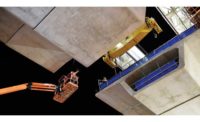Trio of TBMs Dig Deep Down Under in Sydney












“Isabelle,” the third TBM, was launched from Cherrybrook, in November 2014, and will excavate the 6 km from Cherrybrook southeast to Epping. A fourth and final machine is currently being assembled at Cherrybrook to dig the final tunnel to Epping.
The TBMs have begun digging through sandstone and shale on a 24-hour-a-day, seven-day-a-week schedule and are staffed by a rotating crew of 15. To reach the tunneling depth of 9 meters at Bella Vista, crews removed about 120,000 tonnes of rock. At the Cherrybrook site, 75,000 tonnes of rock were excavated to get to the tunneling depth of 16 m. All crushed rock will be recycled, with none going to landfill. Completion of the contract is expected in 2017.
A $262-million contract—awarded to Salini-Impregilo in December of the same year—involves a 4-km elevated system between Bella Vista and Rouse Hill to the northwest. It includes 121 piers and a signature 270-m-long cable-stayed rail bridge over Windsor Road—the first cable-stayed railway bridge in Australia to be built on a curve, say project officials. The average elevation of the system is 9 m, rising to as high as 13 m.
Cherrybrook Station is being constructed in open-cut excavation some 7 m below street level. The design includes a landmark arching-roof canopy, inspired by the local Blue Gum High Forest. Kellyville Station will be built on the elevated guideway and have 1,200 parking spaces.
Northwest Rapid Transit late last year won the third and final major contract, a 2.8-billion operations package. As the largest public-private-partnership contract ever awarded in the state of New South Wales (NSW), it includes eight new railway stations, 4,000 parking spaces, new trains, and 26 km of new cabling, power and signaling systems.
Northwest Rapid Transit consists of MTR Corp. (Australia), John Holland, Leighton Contractors, UGL Rail Services and Plenary Group. The consortium has the responsibility of delivering the NWRL in the first half of 2019, with 15 trains an hour during peak times and a timetable that meets a 98% on-time schedule. It will operate and maintain the NWRL for an initial 15-year period.
As part of the contract for Transport for NSW, Northwest Rapid Transit must meet set customer-service standards, including keeping the stations clean and ensuring the trains and services run on time. Project spokesman Stavro Sofios says that, when operations start, there will be between 5,500 and 6,000 seats every hour in each direction.
When the NWRL opens to customers, it will use six-car trains, but platforms are being built long enough for eight-car trains in anticipation of continued growth. The system, due to open in the first half of 2019, will feature new rapid-transit trains that will run every four minutes at peak times.







